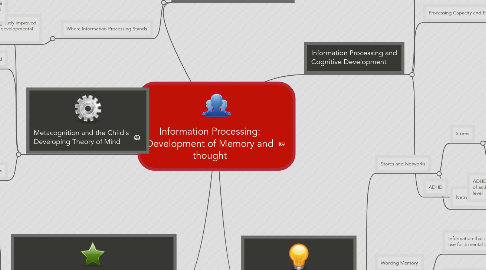
1. Current Approaches to Understanding Cognitive Development
1.1. Computational Models of Thought
1.1.1. models of cognition that are programmed on computers
1.1.1.1. compared to human performance
1.2. production systems
1.2.1. computerized "if-then" statements
1.3. Connectionist Models
1.3.1. Neural network models of cognition that view knowledge as based on patterns of activation among interconnected sets of individual units rather than stored as entire concepts
1.4. the fuzzy trace theory
1.4.1. the view that memory representations vary on a continuum from exact and literal to imprecise and general memory traces based on the gist of the information or event
1.5. Where Information Processing Stands
1.5.1. Computer metaphor greatly improved our understanding of developmental change
1.5.1.1. limits
1.5.1.1.1. doesn't offer a comprehensive, overarching structure for explaining cognitive development
1.5.1.1.2. "cold" because of the emphasis on logical reasoning - no thoughts on social interactions or emotions
2. Metacognition and the Child's Developing Theory of Mind
2.1. the understanding or knowledge that people have about their own thought processes and memory
2.1.1. Metamemory
2.1.1.1. knowledge of memory
2.2. Theory of mind
2.2.1. integrated understanding of what the mind is, how it works, and why it works that way
2.2.2. Appearance-Reality distinction
2.2.2.1. Young children often don't understand the difference of how an object appears to be and how it really is
2.3. Autism and Autistic spectrum disorders
2.3.1. they think that a lack of theory of mind may be a symptom of autism
2.3.2. mind blindness
2.3.3. they have an inability of understand other people's thoughts
2.3.4. autistic spectrum disorders (ASDs) - a group of serious developmental disorders characterized by impairments and social interaction and communication
2.3.5. Echolalaia - when they repeat words and phrases they hear
3. Developing Knowledge and Strategies
3.1. Knowledge base
3.1.1. Information a person knows about a particular topic
3.1.2. Enables you to better integrate new information with previous knowledge
3.2. Strategy Development
3.2.1. Rehearsal
3.2.1.1. Repeating information
3.2.2. Organization
3.2.2.1. Making Relationships
3.3. Elaboration
3.3.1. Create visual or verbal associations to make connections
4. Memory Development
4.1. Stores and Networks
4.1.1. Stores
4.1.1.1. Model of human memory that views information as moving through a series of storage locations, from the sensory stores to the short term store to the long term store
4.1.1.2. Information enters cognitive system through here
4.1.1.2.1. chunking
4.1.2. Networks
4.1.2.1. Model of human memory that view memory as an interconnected network of concept nodes connected by lengths of varying strength
4.1.2.2. can be activated at varying degrees at any time
4.2. Working Memory
4.2.1. Information that is currently in use for a mental task
4.2.2. Characteristics
4.2.2.1. limited in capacity
4.2.2.2. information fades over time
4.3. Long Term memory
4.3.1. Memory of knowledge or events that is permanent
4.3.1.1. unlimited in capacity
4.3.1.2. never decays
4.4. Reconstructive Memory
4.4.1. try to recall information, yet only retrieve some and infer the rest
4.5. Infantile Amnesia
4.5.1. inability to recall information that occurred before the age of 4
4.6. Autobiographical Memory
4.6.1. memories of events of great personal importance
4.6.1.1. vivid and detailed
5. Information Processing and Cognitive Development
5.1. refers to the way computers code information into computer symbols and how they sort, store, retrieve, and use these symbols - the computer is a metaphor for how humans think
5.2. Processing Capacity and Efficiency
5.2.1. Capacity - the amount of information a person can remember at one time
5.2.1.1. explains age differences in performance on difficult tasks
5.2.1.2. Number of items recalled increases with age
5.2.2. Efficiency - the speed and accuracy with which a person can process information
5.2.2.1. operating space
5.2.2.1.1. actual manipulation of information
5.2.2.1.2. children use less operating space as they become more efficient at processing information
5.2.2.2. stroage space
5.2.2.2.1. where the information is stored
5.2.2.3. Automaticity
5.2.2.3.1. the ability to carry out a process with little or no conscious effort, leaving more cognitive capacity to carry out other tasks
5.2.2.3.2. Ex: Children learning to read and becoming more fluent
5.2.3. As children gain speed and capacity, working memory improves. This allows them to process more complex information
5.3. ADHD
5.3.1. ADHD - when the restlessness and high level of activity far exceed the norm for that age level
5.3.1.1. excessively active
5.3.1.2. unable to sustain attention
5.3.1.3. unable to control impulses
5.3.1.4. noticed by 3-4 years of age
5.3.1.5. difficulty in school
5.3.1.6. no cure
